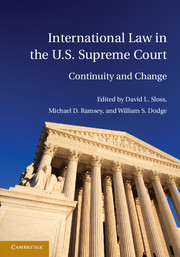Book contents
- Frontmatter
- Contents
- List of Contributors
- Table of Cases
- Acknowledgments
- Introduction
- PART I FROM THE FOUNDING TO THE CIVIL WAR
- PART II FROM THE CIVIL WAR TO THE TURN OF THE CENTURY
- PART III FROM THE TURN OF THE CENTURY TO WORLD WAR II
- PART IV FROM WORLD WAR II TO THE NEW MILLENNIUM
- PART V INTERNATIONAL LAW IN THE U.S. SUPREME COURT IN THE TWENTY-FIRST CENTURY
- V.A TREATIES AFTER 2000
- V.B CUSTOMARY INTERNATIONAL LAW AFTER 2000
- V.C INTERNATIONAL LAW AND CONSTITUTIONAL INTERPRETATION AFTER 2000
- V.D INTERNATIONAL LAW AND STATUTORY INTERPRETATION AFTER 2000
- Main Essay – Empagran's Empire: International Law and Statutory Interpretation in the U.S. Supreme Court of the Twenty-First Century
- Response Essay – Loose Canons: International Law and Statutory Interpretation in the Twenty-First Century
- Response Essay – Empagran: Empire Building or Judicial Modesty?
- V.E INTERNATIONAL LAW AND THE WAR ON TERROR
- VI CONCLUSION
- Index
Response Essay – Loose Canons: International Law and Statutory Interpretation in the Twenty-First Century
Published online by Cambridge University Press: 05 July 2011
- Frontmatter
- Contents
- List of Contributors
- Table of Cases
- Acknowledgments
- Introduction
- PART I FROM THE FOUNDING TO THE CIVIL WAR
- PART II FROM THE CIVIL WAR TO THE TURN OF THE CENTURY
- PART III FROM THE TURN OF THE CENTURY TO WORLD WAR II
- PART IV FROM WORLD WAR II TO THE NEW MILLENNIUM
- PART V INTERNATIONAL LAW IN THE U.S. SUPREME COURT IN THE TWENTY-FIRST CENTURY
- V.A TREATIES AFTER 2000
- V.B CUSTOMARY INTERNATIONAL LAW AFTER 2000
- V.C INTERNATIONAL LAW AND CONSTITUTIONAL INTERPRETATION AFTER 2000
- V.D INTERNATIONAL LAW AND STATUTORY INTERPRETATION AFTER 2000
- Main Essay – Empagran's Empire: International Law and Statutory Interpretation in the U.S. Supreme Court of the Twenty-First Century
- Response Essay – Loose Canons: International Law and Statutory Interpretation in the Twenty-First Century
- Response Essay – Empagran: Empire Building or Judicial Modesty?
- V.E INTERNATIONAL LAW AND THE WAR ON TERROR
- VI CONCLUSION
- Index
Summary
In the early years of the United States, the relationship between international law and statutory interpretation was relatively straightforward. The Supreme Court simply applied the Charming Betsy canon “that an act of Congress ought never to be construed to violate the law of nations if any other possible construction remains.” The presumption against extraterritoriality grew from the marriage of this canon to an international law rule that jurisdiction was territorial. During the twentieth century, the presumption against extraterritoriality separated from the Charming Betsy canon and came to rest on different justifications – first on comity and then on “the assumption that Congress is primarily concerned with domestic conditions.” But these canons remained relatively stable. Near the century's end, Justice Antonin Scalia would list just two principles of interpretation relevant to determining the extraterritorial reach of a statute: the presumption against extraterritoriality and the Charming Betsy canon.
The first decade of the twenty-first century, by contrast, has been one of ferment. In Empagran, Justice Stephen Breyer announced a new rule: construing statutes “to avoid unreasonable interference with the sovereign authority of other nations.” Although he cited the Charming Betsy in support of this rule, avoiding interference with the sovereign authority of other nations is something quite different from avoiding violations of international law. A year later, Justice Breyer (again speaking for the Court) announced yet another new canon in Small v. United States.
- Type
- Chapter
- Information
- International Law in the U.S. Supreme Court , pp. 547 - 552Publisher: Cambridge University PressPrint publication year: 2011
- 1
- Cited by



